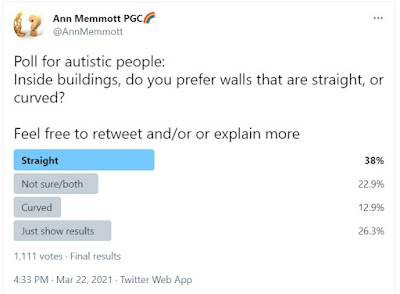The photograph above shows a typical group of Autistic people.
We're one sentence into this blog and I expect a number of people are already shocked.
1) The group doesn't look anything like a group of young white males with 'rigid, repetitive' behaviour who 'lack empathy' and are a Deficit & Disorder.
2) I used the term Autistic people rather than People With Autism or People with Autism Spectrum Disorder.
As regular readers will know, I'm a Professional in this field, working nationally & internationally with Autistic people and their families, with healthcare professionals, and with a range of other groups. I'm also delighted to be trekking through year 4 of Post Graduate academic study. Well, I say 'delighted', but the delight is balanced with concern about the number of times I am told I am a Rigid Repetitive Disordered Deficit in any one day. Yes, I'm Autistic.
So is our lovely son.
So are most of our lovely friends and colleagues, contacts and fellow Professionals/advisers.
Back to that photo. Autistic people are in every walk of life. Every one of them of full worth, whether in paid employment or not. I want to start by making that clear. I also want to make clear that some have a really tough time in life and need excellent support around them, as well as excellent support for their families.
The reality is that if you travel through a city for a couple of hours, you'll pass by Autistic older people. Autistic parents. Autistic grandparents. Autistic Accountants. Autistic Doctors. Autistic Faith Leaders. Autistic Teachers. Autistic Artists and Musicians. Autistic people of all kinds, all ethnicities, all IQs.
You'll notice that I'm often putting a capital letter in the word Autistic. Same as we do with the Deaf community by capitalising the D.
As the Royal College of Psychiatrists wrote in their report (2020), we have found very few of the autistic adults. Why is this? Well...because who on earth would go forward for a diagnosis if the end result was that they were going to be called a Deficient Disordered Burden at the end of it? Even those with a diagnosis are forced into hiding, a lot of the time, thanks to that narrative. Who would recognise that they're autistic, if all the descriptions are white boys who are biting someone (!) or solving equations whilst playing with a train?
Excellent support never starts by calling a fellow human being a deficient disordered empathy-lacking burden.
Yet that's what we do.
It's written in the manuals that these are the 'correct terms', and so we use those terms.
The terms do damage. Here's a useful Twitter thread linking to the healthcare papers discussing how stigmatising language gets in the way of support, care and treatment. Thread by an Occupational Therapist
What terms are preferred instead, by the autistic communities? This is a generalisation from research. Always ask for individual preferences.
Old term: Autism Spectrum Disorder. New term: Autistic.
Old term: "Has autism" New term: "Is Autistic"
Old way of describing us: Rigid, repetitive behaviour with outbursts of anger. Obsessive interests.
New way of describing us: Autistic people may be concerned about sudden change, as we are protecting our brain's ability to function. Sudden sensory and social change can overwhelm our brains and force us into an unwanted and deeply exhausting brain event. This is either a shutdown where we go still and quiet, or, for some, a meltdown in which we are unable to prevent some wild-looking behaviour. It is linked to epileptiform brain spikes, in recent research. Many of us benefit from the flow of routine, or a passionate interest in a subject, in which we often then specialise as a career or volunteering choice.
Old way of describing us: High Functioning, Low Functioning. Mild. Severe.
New way of describing us: Some Autistic people are good at 'masking'. Basically, pretending not to be autistic. It's exhausting, demoralising, inauthentic, and leads to autistic burnout, mental health conditions and potentially suicide. This can be mistaken for a 'mild' form of autism. Others cannot mask or do not choose to mask, and they are then described as 'low functioning'. This isn't good. A better way is to describe us as having lower support needs, or higher support needs, but being aware that this isn't static for life. It varies with illness, age or other demands placed on us.
Old way of describing us: Lacking in empathy.
New way of describing us: Autistic people are often very caring, deeply focused on social justice. As Autistic people have a different social communication system, and often experience a delay in processing emotions, this has been mistaken as a 'lack of empathy'. In reality, nonautistic people are every bit as bad at guessing what we're thinking and feeling, by looking and hearing. This is called 'Double Empathy Theory', and both neurotypes need to learn to speak one another's language. Research on this - see bottom of this blog.
Old way of describing us: Antisocial, a loner, 'in their own world'.
New way of describing us: Autistic people have the same range of personalities as everyone else. Some are more extravert. Others are more introvert. Most of us will struggle to be in a busy, noisy place for long because of sensory and social overload pushing us into brain events (see above). We also don't use eye contact or facing people to signal love, interest or listening. Our signalling is different, and often involves minimising eye contact, and sitting parallel, not facing. Often we make good friendships with a small number of other autistic people, with whom we share deep interests.
Old way of describing us: Lacking in creativity, using rigid and inappropriate methods of play.
New way of describing us: Autistic people learn differently, and will focus on specialising on one subject first, before generalising that to others. Many will use objects as part of a needed flow, ritual or relaxation technique, in the same way as some cultures use ceremonies to relax and destress. This may look like lining things up, or using the same movement with a toy over and over. Other people may not detect the slight differences we're tested, or understand why.
Old way of describing us: Stereotyped body movements. Stereotypy.
New way of describing us: Autistic stimming is often vital for most Autistic people as a way of regulating our brain's processing. It is calming, centring, enables us to find where our body is in three dimensions (proprioception) and leads to a feeling of joy. We may rock, flap, wiggle toes, make a repetitive sound, or (if deep in masking) keep those movements and repetitions so small that others are completely unaware of them). Some use repetitive movement to mark time, or to communicate, or to judge distance. Being clear that if a repetitive movement is actually causing physical harm, of course it must be redirected to a safer alternative. Autistic people generally learn better when allowed to stim.
This is just a small selection of different terms, and different ways we now understand autism.
If you are hoping for the academic references, make your way to
http://annsautism.blogspot.com/2019/01/autism-some-vital-research-links.html
If you want to see what thousands of autistic people have been voting for, in informal polls and some surveys, make your way to
https://annsautism.blogspot.com/2020/09/so-what-might-autistic-people-think.html
If you and your team want fabulous, cheery training that truly understands the needs of your organisation, there are so many good groups now offering this. I mention some from time to time, including NDTi, AT-Autism, and the teams working with the Anna Freud Centre. All are used by NHS Professionals for CPD training or other bespoke training, and I'm delighted to work with those groups from time to time. Many other excellent ones exist.
Thank you for reading this starting point.
















